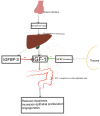Acromegaly and the Colon: Scoping Beyond the Pituitary
- PMID: 34987906
- PMCID: PMC8716343
- DOI: 10.7759/cureus.20018
Acromegaly and the Colon: Scoping Beyond the Pituitary
Abstract
Acromegaly is a complex endocrinological disorder commonly caused by hypersecretion of growth hormone (GH) typically due to pituitary gland tumors. Patients with acromegaly who are successfully treated and biochemically managed have a reasonably average life expectancy. However, it causes a cascade of multi-systemic involvement throughout the patient's life, including cardiovascular, neuropsychiatric, respiratory, metabolic, neurological, neoplastic, and gastrointestinal involvement, resulting in a higher rate of hospitalization, lower quality of life, and a shorter life expectancy. Although cardiovascular complications are the primary cause of death in patients with acromegaly, malignancy is now emerging as a major killer in these individuals. Colorectal carcinoma has been reported to be prevalent in acromegaly individuals. This review article has compiled studies to demonstrate a link between acromegaly and colorectal neoplasia, intending to provide a strong foundation for their clinical relationship. This article has summarised a potential pathogenic mechanism and provided insights into the clinical presentation of such patients. Furthermore, this article has provided a brief overview of current screening recommendations for colorectal neoplasia in acromegaly patients.
Keywords: acromegaly; colorectal carcinoma; colorectal polyps; growth hormone; insulin-like growth factor 1.
Copyright © 2021, Patel et al.
Conflict of interest statement
The authors have declared that no competing interests exist.
Figures
References
Publication types
LinkOut - more resources
Full Text Sources

